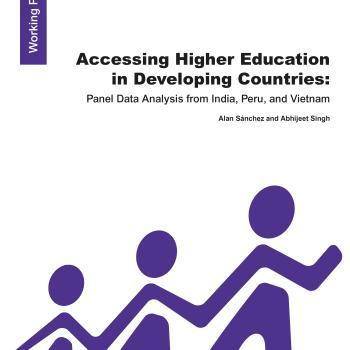
We use unique individual-level panel data from India (Andhra Pradesh), Peru and Vietnam on a cohort of individuals surveyed from the age of 8 years to 19 years to study factors affecting enrolment in higher education in these middle-income countries. We document (a) that similar to nationally representative data, the proportion having accessed higher education at this age is high (~35-45 per cent); (b) that there are steep gradients in higher education access across wealth and parental education; (c) that a substantial part of the gradient with regard to parental education is explained by parental and child aspirations for education at 12 years of age and previous measures of learning; (d) that in contrast, wealth gradients decline much less with the inclusion of these variables, indicating that the correlation between household economic circumstances and higher education access is only partly due to differences in early-childhood human-capital formation; and (e) that there are important differences in terms of gender in access to levels of higher education (favouring boys in India and girls in Vietnam) and in the association of various household and individual characteristics and parental and child aspirations with enrolment in higher education by 19 years of age. To the best of our knowledge, this is the first such comparative longitudinal analysis of access to higher education in developing-country settings.
This working paper was published as an article in Volume 109 of World Development (2018), available here.

We use unique individual-level panel data from India (Andhra Pradesh), Peru and Vietnam on a cohort of individuals surveyed from the age of 8 years to 19 years to study factors affecting enrolment in higher education in these middle-income countries. We document (a) that similar to nationally representative data, the proportion having accessed higher education at this age is high (~35-45 per cent); (b) that there are steep gradients in higher education access across wealth and parental education; (c) that a substantial part of the gradient with regard to parental education is explained by parental and child aspirations for education at 12 years of age and previous measures of learning; (d) that in contrast, wealth gradients decline much less with the inclusion of these variables, indicating that the correlation between household economic circumstances and higher education access is only partly due to differences in early-childhood human-capital formation; and (e) that there are important differences in terms of gender in access to levels of higher education (favouring boys in India and girls in Vietnam) and in the association of various household and individual characteristics and parental and child aspirations with enrolment in higher education by 19 years of age. To the best of our knowledge, this is the first such comparative longitudinal analysis of access to higher education in developing-country settings.
This working paper was published as an article in Volume 109 of World Development (2018), available here.

